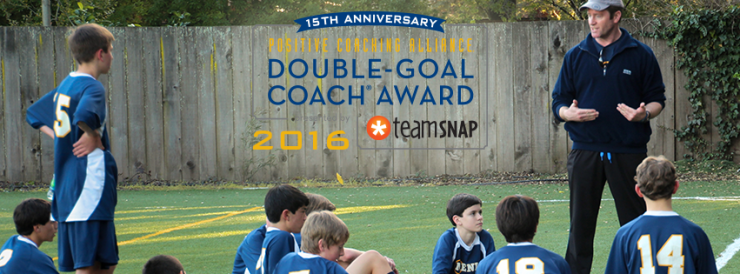More Than Just Coaching Soccer – Teaching Life Lessons To Youth Athletes
Coaches play an incredibly influential role in the lives of athletes. Often players spend more time with their coaches than anyone else outside of the home environment. Therefore, it is important that school and youth sports organization leaders and administrators take care in setting standards of success for the coaching staff, especially when hiring 1st-time coaches.
Positive Coaching Alliance (PCA), is a national non-profit developing “Better Athletes, Better People” by working to provide all youth and high school athletes a positive, character-building youth sports experience. PCA believes these standards of success are reflected not just on the scoreboard – while winning is important, it is more important that coaches teach life lessons through sports. PCA considers a coach that focuses on both of these outcomes to be a Double-Goal Coach®.

PCA’s Double-Goal Coach Award is given to youth and high school sports coaches from throughout the U.S. who embody the ideals of the Double-Goal Coach, striving to win, while also pursuing the more important goal of teaching life lessons through sports. The awards program this year drew more than 2,400 nominations.
The award includes $200; a certificate; recognition in PCA’s website, newsletters and media campaigns; and the chance to accept the honor in California during PCA’s National Youth Sports Awards Dinner and Auction Presented by Deloitte.

Here are the 2016 Soccer Coach Award Winners:
Profiles contain excerpts from interviews with PCA’s David Jacobson.
Kip Archibald, Skyline High School
“A win doesn’t define you, and neither does a loss; what defines you is your attitude after a win, and how you overcome a loss, and become better the next day.”
Explaining his broader coaching philosophy, Archibald said, “I hope to prepare girls for life. It’s not always about winning. It’s about being able to adapt and make decisions on the field and off the field and be part of a team.
“You’ve got to have fun. Enjoy this. You’re a high school kid just one time. But just like in your work-life you’re going to meet different people who have different ideas, and you have to be able to adapt and play as a team.”
Tom Blencoe, Liverpool FC International Football Academy
“Our club is not in it to win every game, especially at the younger levels,” Blencoe said. “We want to develop players the right way. We want to win through our development, win through our education. It’s about winning the right way, with good sportsmanship and integrity. My definition of success is reaching your true potential as a player and as a person.”
Blencoe also uses his position to teach life lessons through soccer. “The players are the ones who choose whether they sprint or jog, whether they’re going to go all the way to that white line or skip it by a foot. I’m trying to stress to them they they’re not going to be able to get away with those choices if they want to be successful in life. In work and in school you need to give everything that you’ve got.”
Matt DeFranza, Calvary Academy
“I’m not too much older than they are, so I try to come at it from an older brother’s perspective. Guys have felt comfortable coming to me with problems off the field.”
On the field, DeFranza is intent on capitalizing on teachable moments. For example, after a hard loss one of his players sat alone blaming himself and worrying aloud about facing his teammates, so DeFranza consoled and supported him by telling him, “Your job is to go back there and keep your head up. Even in the hard times you can’t quit. Real strength is grace under pressure, and even in failure you need to learn how to lead well. — There’s no opportunity to teach that in the classroom. I love teaching these young men that kind of virtue.”
Bethany Goble, Chickasha High School
“In life they’re going to be challenged with different decision-making challenges,” said Goble. “We might make mistakes, but how well do we make mistakes? And what do we learn from them? At the end of the day, we’re not all going to be soccer players when we’re 50 years old, but I want them to be productive citizens.”
Dennis Pruitt, SpeedStreet Football Academy
“You want them to be competitive,” said Pruitt, “but you also want to make sure they have all the tools they need for later life. I want them to have will, to have some confidence in themselves, an understanding that hard work yields good things, that you’re not going to have success every time, but if you keep working hard, you’re more likely to have success at the biggest moment, when it matters most.”
“When you try to convey that kind of information to young people it’s a little complicated. They’re all like little Rubik Cubes. They have their own personality, and you have to adapt your style to each one of them, and it doesn’t always take with all of them instantly. At the end of the day, you need to put all that stuff first. As an athlete and a competitor throughout your life, you think about winning, but as a coach you have to think about development. Most of the kids won’t play soccer in college, but hopefully the lessons they take away will be valuable in everyday life.”
Jorge Vieyra, Earl J. Wooster High School
“I tell each member of the team that no matter what, we’re going to back each other up. ‘If Johnny’s failing, we’re going to help him out.’ Sometimes there are kids who don’t have enough money for a meal, and we all pitch in and share food. If we’re all in this together, then when we step on the field we’ll have a better performance. Everybody will have fun and eventually the winning and the overall goal of going to college will become a reality.”
“I attended Wooster and graduated from there. I was one of those who had to go practice and then go to work, so I know exactly what they’re going through. They feel trapped. They feel that there’s no way out, and that they’re going to be working all their lives for low pay. We want to teach the kids that there are opportunities for them to take.”
Eric Walter, Kent United Youth Soccer Club
“Soccer was an integral part of my life. Outside of my mom and dad, the most important people in my life were my soccer coaches, so I got started coaching soccer as soon as I could,” said Walter.
“I really want them to feel a part of something. I want this to be a memorable experience for them. Going to tournaments as a 12-year-old with my teammates were some of the best times of my life, so I really want to build that camaraderie. Also, I want to teach some of the greatest life lessons you can learn about perseverance, integrity and accountability.”

Related Articles: Brandi Chastain: Athletes Are In Charge of Their Destiny, Positive Coaching Alliance Partners with SoccerToday






